#cordell reagon
Text



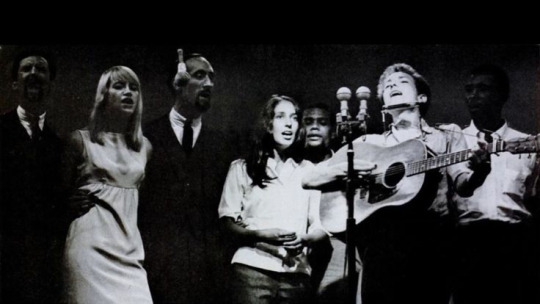
Peter Yarrow, Mary Travers, Paul Stookey, Joan Baez, Bob Dylan, Bernice Reagon, Cordell Reagon, Charles Neblett, Rutha Harris, Pete Seeger, and Theodore Bikel at the Newport Folk Festival, July 1963.
#peter paul and mary#peter yarrow#mary travers#paul stookey#joan baez#bob dylan#bernice reagon#cordell reagon#charles neblett#rutha harris#pete seeger#peter seeger#theodore bikel#newport folk festival#newport folk fest#1963#60s#folk#folk music#music#60s folk music#photo archive#not broadside
19 notes
·
View notes
Text
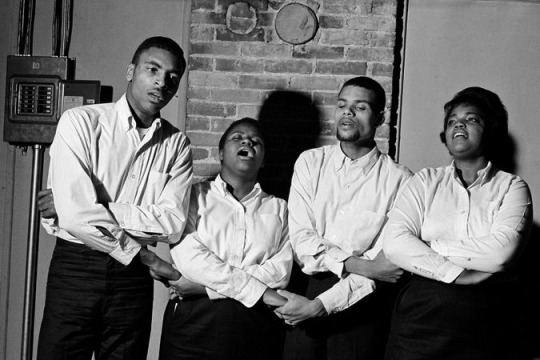
#VoicesfromtheStacks
Voices from the Stacks: Freedom Summer, 1964
In the summer of 1964, young people, many of them college students, traveled to Mississippi to combat voter suppression. Less than 10% of the state's eligible Black voters were registered. That effort was called Freedom Summer, and civil rights activists hoped to combat the racism that kept African Americans from the polls.
Special Collections is home to the Eric Morton Civil Rights Papers that include audio of interviews with civil rights heroes including Fannie Lou Hamer and Stokely Carmichael. There is also singing from community meetings in Mississippi, 1964! Morton was a civil rights leader who met and befriended Steve Smith, a white sophomore at the University of Iowa. The two men were beaten by police and jailed while delivering voter registration materials. Because of the bond between them, Morton wanted his papers to be housed with Smith's.
The Freedom Singers we hear in the video above was formed by SNCC (Student Non-Violent Coordinating Committee) leaders Cordell Reagon, Bernice Johnson, Rutha Mae Harris, and Chuck Neblett. They traveled to community meetings, often held in churches and other local spaces, and led songs of the freedom movement. The clip from the video is part of a larger recording and includes "We Shall Overcome," "Freedom Train," "Ballad of Medgar Evers" and more.
This Juneteenth, we remember the work done while acknowledging how far we have to come. This summer marks the 100th anniversary of the Tulsa Race Massacre in which a white mob decimated the prosperous Black Greenwood District, destroying over a thousand homes and businesses, killing hundreds and robbing Black families of generational wealth. It marks a year since George Floyd was murdered by a white policeman. And it was Wednesday, 6/17/2021 that Juneteenth was voted a federal holiday.
Though we house some collections of Black Iowans, we see the work that needs to be done in archiving and preserving Black stories and voices. It is our honor to continue amplifying Black voices, both past and present.
–Rachel M-H, Special Collections Olson Graduate Assistant
[Photo of four Freedom Singers at Caffe Lena c. 1963: copyright Joe Alpert]

#voicesfromthestacks#uiowaspecialcollections#uiowa#civil rights#juneteenth#video#audio#sncc#black voices#archives#freedom singers#we shall overcome#african america history
72 notes
·
View notes
Photo
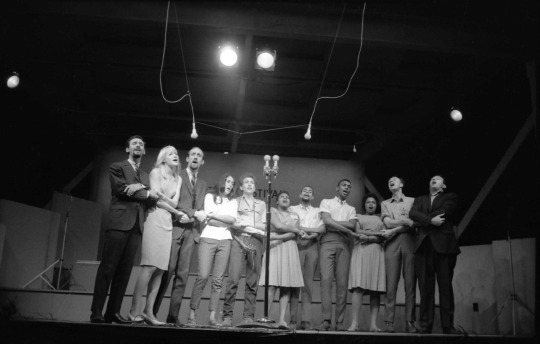
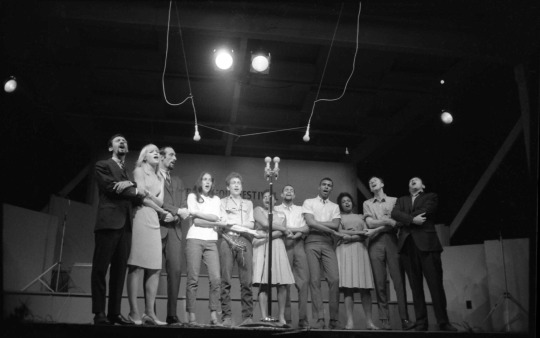
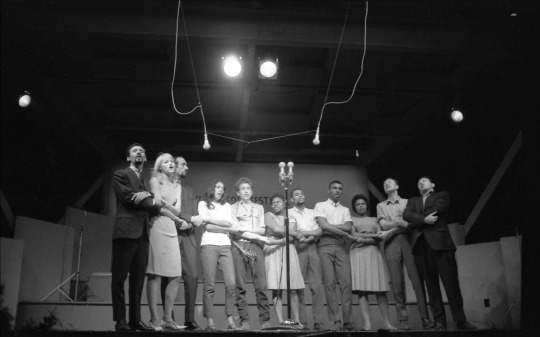
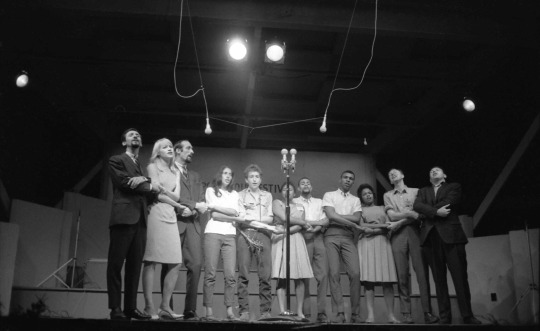
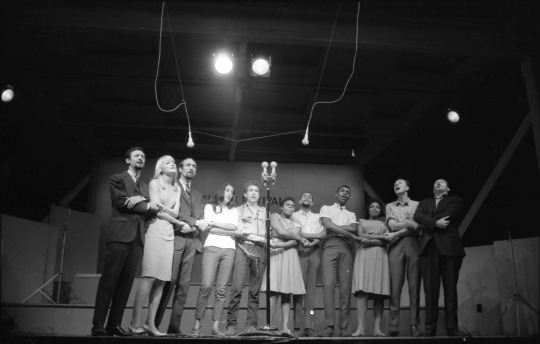
Peter, Paul, & Mary, Joan Baez, Bob Dylan, The Freedom Singers (Charles Neblett, Rutha Harris, Cordell & Bernice Reagon), Pete Seeger, & Theodore Bikel perform “We Shall Overcome,” hand-in-hand at the Newport Folk Festival, July 26, 1963 © Rowland Scherman.
#Peter Paul & Mary#Peter Paul and Mary#Joan Baez#Bob Dylan#Baez and Dylan#The Freedom Singers#Pete Seeger#We Shall Overcome#The Civil Rights Movement#Civil Rights Movement#The Newport Folk Festival#Newport Folk Festival#Newport#Rhode Island#RI#1963#1960s#Rowland Scherman#Theodore Bikel
41 notes
·
View notes
Text
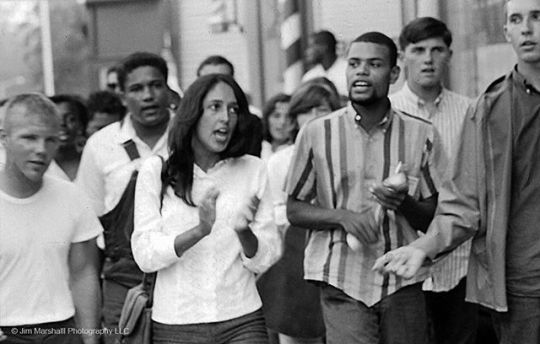
Today is the 57th anniversary of the March on Washington. In July 1963, a month before the “March on Washington” Jim was at the Newport Folk Festival where James Forman, Cordell Reagon & Joan Baez organized a trial run for the March. They marched past Newport mansions into Touro Park where SNCC’s Executive Secretary, James Forman & Freedom Singer’s leader, Cordell Reagon rallied support for the March on Washington.
Jim Marshall captured history with his Leica M2.
2 notes
·
View notes
Photo
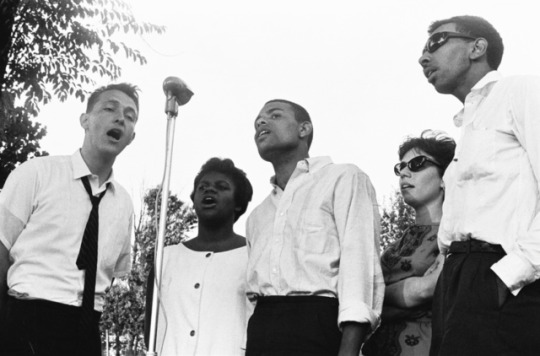
Danny Lyon Student Nonviolent Coordinating Committee (SNCC) Members Bob Zellner, Bernice Reagon, Cordell Reagon, Dottie Miller, and Avon Rollins Singing at a Civil Rights Rally in Danville, Virginia 1963
Shortly after this photograph was taken, the rally was broken up by police, with many participants arrested.
21 notes
·
View notes
Video
"Go all the way to the edge, don't settle for a safe position." ~Cordell Reagon On this episode, Gary "G-Diddy" Combs came through on the show. We jump right into some news on the NBA's upcoming season, the money crusade concerning some judges, the Pandora Papers, political politricks, entertainment news and new segments of "The New" and "Knock It Off." Thanks for tuning in. #anchor #spotify #applepodcasts #googlepodcasts #radiorepublic #pocketcasts #overcast #breaker #politricks #browns #nfl #cavs #legislation #vote #eoto #thenew #knockitoff #marsellconsulting #alekroberts #thebsidepodcast 👇🏿 https://youtu.be/LRjSIVjrE9Y 👇🏿 https://tinyurl.com/44s2mw74 👇🏿 thebsidepodcast.com 👇🏿 alekroberts.com (at Anaheim, California) https://www.instagram.com/p/CU204l9lxg_/?utm_medium=tumblr
#anchor#spotify#applepodcasts#googlepodcasts#radiorepublic#pocketcasts#overcast#breaker#politricks#browns#nfl#cavs#legislation#vote#eoto#thenew#knockitoff#marsellconsulting#alekroberts#thebsidepodcast
0 notes
Video
#throwbackthursday Part I (on the Revolutionary Harriet Tubman) with @toshireagon and BIGlovely! Daughter of Bernice Johnson Reagon and Cordell Reagon. Artists, social activist & Founding members of the SNCC Freedom Singers in Albany Movement, GA during the Civil Rights Movement. Toshi was born in Atlanta, GA but raised in Washington, DC. Her music is progressive but deep down at the core, Toshi can pull the shit outta your heart strings. Giving you that soul funk, melody rock & blues. The GOSPEL! Lmao. Fucks with Toshi & BIGlovely!
1 note
·
View note
Link
The rise of “black power” led Pete Seeger to realize he had become a towering figure in a movement he didn't fully understand. The way he dealt with criticisms of him and his friends holds lessons for today.
In 1962, after performing at a benefit for the Student Nonviolent Coordinating Committee (SNCC), Pete Seeger met a 19-year-old singer African-American singer named Bernice Johnson. Having heard about her reputation as a civil rights singer, Seeger recommended to Johnson that she start an ensemble of SNCC singers to tour the country singing civil rights songs. Whether because of Seeger's advice or other motivations, Johnson ended up moving to Saratoga Springs, New York later that year, where she worked as a waitress at a folk club. There she linked up with folk promoters who secured her a performance at the folk magazine Sing Out!'s 1962 Carnegie Hall “Hootenanny”. She soon teamed up with SNCC members Cordell Reagon, Charles Neblett and Rutha Harris to form the Freedom Singers. The group toured the country, with Seeger's wife Toshi acting as their manager.1 During this time, the friendship between Johnson and the Seegers blossomed, leading to the iconic photo at the 1963 Newport Folk Festival of Johnson holding hands with Bob Dylan as they helped lead the crowd in singing Seeger's arrangement of the song “We Shall Overcome”.2 The next year Johnson named her first child Toshi.
The story of Johnson and the Freedom Singers was just one of many that symbolized the growing cooperation between the mostly northern, urban, white folk revival movement, and mostly southern civil rights organizations such as SNCC. While Seeger and Dylan were raising money for SNCC and the Freedom Riders, left-wing folk organizations mingled with and lent support to the civil rights movement in innumerable ways.
Moved by the images of civil rights demonstrators being attacked by fire hoses and police dogs in Birmingham, Alabama, Seeger began urging white folkies from New York to go south, telling a crowd at Carnegie Hall in 1963, “If you want to get out of a pessimistic mood yourself, I've got one sure remedy. Go help those people in Birmingham or Mississippi.”3 Seeger's call to “go help those people” resonated with many northerners, who soon trekked to the deep south by the thousand. Predictably, the influx of idealistic youths with little understanding of southern culture created some serious issues for groups like SNCC. All of a sudden, national media began to focus on the white people coming into Mississippi from New York and California rather than the black organizers in Mississippi who had been working tirelessly in their communities for years. White people began taking African-American people's positions in the SNCC offices, and incidences of black-white extramarital sex were damaging the reputation of the organization. Issues of another kind began to arise from the arrival of northern blacks into the organization. As Bernice Johnson recalls, “There were a group of people coming out of Howard University: Courtland Cox, Stokely [Carmichael], Lawrence Guyot. Northern blacks were coming into the organization...it changed the timbre, rhythm, and style of the organization. At SNCC meetings, those would be the only people talking. And they were more glib, articulate, flowing, had read more...I remember one meeting Stokely got up and said, 'Well I is sorry that I graduated from college and learned how to talk.'”4
Despite being an outsider, Carmichael became the leader of a growing “black power” movement within SNCC. Disheartened by years of brutality and the seeming hopelessness of non-violence, Carmichael and his supporters began to argue that it was impossible to work alongside whites, and that the the whites coming into the organization should be focusing on confronting racism in their own communities in the north.
Quote:
The question then is, how can white people move to start making the major institutions that they have in this country function the way it is supposed to function? That is the real question. And can white people move inside their own community and start tearing down racism where in fact it does exist? Where it exists. It is you who live in Cicero and stop us from living there. It is white people who stop us from moving into Grenada.
Carmichael had a point, but disconnected from the infighting of SNCC, in 1965 Seeger and his wife accepted a personal invitation from Dr. Martin Luther King Jr. to join the the march from Selma to Montgomery, Alabama in support of voting rights for African-Americans. Exhilarated by the songs he heard and somewhat oblivious to the tensions within SNCC, Seeger returned to New York after the march, staying in touch with Carmichael and others about organizing in New York to help SNCC. However, the respect between Seeger and Carmichael was not mutual. In the summer of 1965, Carmichael went to the office of Seeger's manager Harold Leventhal, demanding that SNCC receive more money in exchange for all the free publicity given to Leventhal's performers, such as Seeger. The conversation soon became heated, and Leventhal claims Carmichael began lobbing “anti-Semitic charges” at him.5
Carmichael's radical approach towards white SNCC supporters soon became the new norm of the organization. Soon whites were purged from SNCC, and Carmichael led the attack on the black civil rights old guard of MLK and John Lewis. The shift in attitudes of African-American civil rights activists towards the folkies is embodied by the story of Julius Lester. A writer who had at one time written for the political folk-music journal Broadside, co-founded by Seeger himself, by the end of the 60s Lester was scathingly attacking the folk movement in his book Search for the New Land:
Quote:
What did they know of these songs we would sing in church and in the field...And who was this Joan Baez talking about all her trials would soon be over. The bitch was white, wasn't she? Plus, she was good-looking and was making money. The only kind of trials she could have had was deciding whether she should fly first-class or tourist...Blacks have always served as a path which whites have used to try and get out of the concentration camps of their souls.6
Lester's harsh attack undeniably rings with much truth. The idea that “black have always served as a path which whites have used to try and get out of the concentration camps of their souls,” seems to tally with Seeger's 1963 call to action at Carnegie Hall. Furthermore, whereas Seeger did spend a full two days marching between Selma and Montgomery, stars (though not folk musicians) Tony Bennett and Anthony Perkins seemingly capitalized on the media attention by flying into Montgomery on the last day to join the march.7
Shocked by the anger he had been oblivious to, Seeger realized he had become a towering figure in a movement he didn't fully understand. Wisely, he chose to largely withdraw himself from the frontlines of the exploding factional infighting that would end up creating decades of still simmering enmity between SNCC members and supporters, both white and black. Instead of feeling offended by the attacks against him and his friends, Seeger listened, and by the end of 1966 he had in fact followed the advice of black power advocates, turning his activist efforts towards local organizing.
Looking back on the saga it's hard to choose sides. The whites who Lester viciously derided made real sacrifices coming south to help SNCC, many were murdered. It would be easy now to sit here and criticize their actions, though few today would make the same sacrifices. At the same time, the criticisms leveled by people like Carmichael and Lester were were based on serious grievances that many African-Americans in SNCC had with white members. Carmichael wondered why white people were coming south, he thought it would do much more good if white people would confront racism in their own communities in the north. Without the aggressive criticisms leveled by Lester and Carmichael, the issues might not have been addressed properly.
Seeger, for his part, realized that the situation was getting ugly, and that no matter which side he supported in the argument he would not only hurt himself, but the movement in general. Thus, rather than get defensive he chose to listen, and to shift his focus to his own backyard where his activism was much better poised to make a positive difference in the world.
All in all, a good lesson that many of us on the left can learn from.
1. Cohen, Ronald. "Rainbow Quest: The Folk Music Revival & American Society 194-1970", 186-187
2. Dunaway, David, "How Can I Keep from singing?: The Ballad of Pete Seeger", 280
3. Dunaway, 282
4. Dunaway, 290
5. Dunaway, 299-300
6. Cohen, 207
7. Dunaway, 297
1 note
·
View note
Audio
#NowPlaying Keep Your Eyes on the Prize by Charles Jones and Cordell Reagon
1 note
·
View note
Text
Les Freedom Singers, au premier plan folk de la lutte contre la ségrégation
Les Freedom Singers ont été créés à l’origine en 1962 pour collecter des fonds pour le Comité de coordination des étudiants non violents.
Leurs chansons et leur musique ont joué un rôle important dans le mouvement des droits civils. L’un des principaux fondateurs du groupe était Cordell Hull Reagon, connu pour ses nombreux ateliers de formation à la non-violence et ses efforts de lutte contre…
View On WordPress
0 notes
Photo
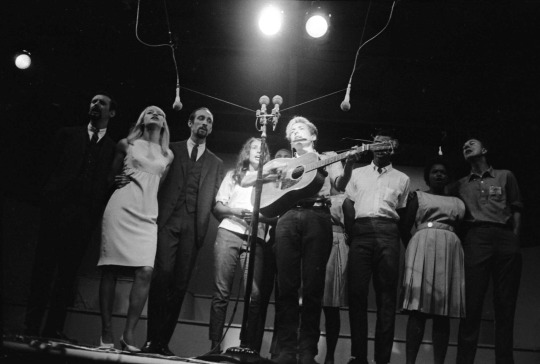

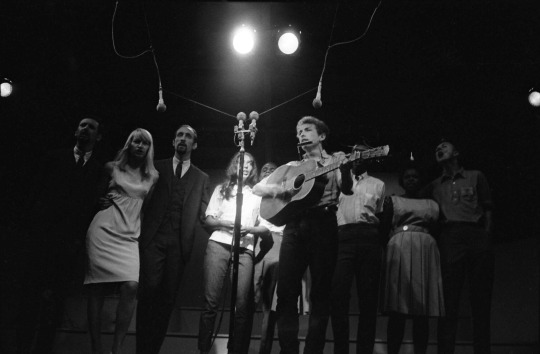
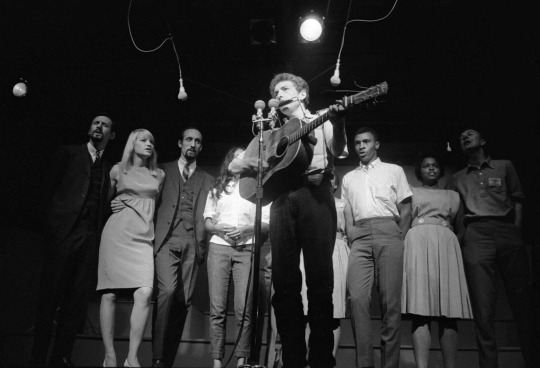
Bob Dylan joined by Peter, Paul, & Mary, Joan Baez, The Freedom Singers (Charles Neblett, Rutha Harris, Cordell & Bernice Reagon), and Pete Seeger, on “Blowin’ in The Wind,” Newport Folk Festival finale, July 26, 1963 © Rowland Scherman.
#Bob Dylan#Peter Paul & Mary#Peter Paul and Mary#Joan Baez#Baez and Dylan#The Freedom Singers#Pete Seeger#Blowin' In The Wind#The Newport Folk Festival#Newport Folk Festival#Newport#Rhode Island#RI#1963#1960s#The Civil Rights Movement#Civil Rights Movement#The Freewheelin' Bob Dylan#Rowland Scherman
31 notes
·
View notes
Audio
#NowPlaying Keep Your Eyes on the Prize by Charles Jones and Cordell Reagon
0 notes